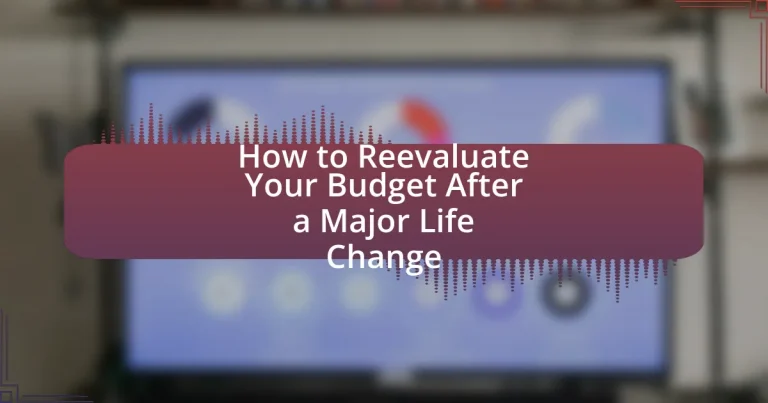Reevaluating your budget after a major life change is essential for maintaining financial stability. This process involves assessing changes in income, expenses, and financial goals due to events such as job loss, marriage, divorce, or the birth of a child. Key steps include analyzing current financial circumstances, identifying necessary adjustments, and utilizing budgeting tools to track spending effectively. The article emphasizes the importance of adapting budgets to reflect new realities, highlights common pitfalls to avoid, and provides practical tips for successful budget reevaluation.

What does it mean to reevaluate your budget after a major life change?
Reevaluating your budget after a major life change means assessing and adjusting your financial plan to reflect new circumstances, such as a job loss, marriage, divorce, or the birth of a child. This process involves analyzing income, expenses, and financial goals to ensure they align with the current situation. For instance, a study by the National Endowment for Financial Education indicates that individuals who adjust their budgets after significant life events are more likely to maintain financial stability.
Why is it important to reassess your budget during significant life events?
Reassessing your budget during significant life events is crucial because these events often lead to changes in income, expenses, and financial priorities. For instance, events such as marriage, having a child, or a job loss can drastically alter financial circumstances, necessitating a reevaluation of spending habits and savings goals. According to a study by the National Endowment for Financial Education, 70% of individuals experience financial stress during major life transitions, highlighting the importance of adapting budgets to reflect new realities. Adjusting your budget ensures that financial resources align with current needs and future goals, ultimately promoting better financial stability and decision-making.
What types of major life changes typically necessitate a budget reevaluation?
Major life changes that typically necessitate a budget reevaluation include marriage, divorce, the birth of a child, job loss, career change, retirement, and significant health issues. Each of these events alters financial responsibilities and income levels, requiring individuals to reassess their financial plans. For instance, marriage often combines incomes and expenses, while divorce can lead to increased individual costs. The birth of a child introduces new expenses, and job loss or career changes can drastically affect income. Retirement shifts focus from earning to spending savings, and health issues can lead to unexpected medical costs. These changes highlight the need for a thorough review of financial priorities and budgeting strategies.
How can failing to adjust your budget impact your financial health?
Failing to adjust your budget can lead to significant negative impacts on your financial health, including overspending, increased debt, and inability to meet financial goals. When individuals do not revise their budgets after major life changes, such as job loss or increased expenses, they may continue to allocate funds based on outdated information, resulting in a mismatch between income and expenditures. This misalignment can cause financial strain, as evidenced by a study from the National Endowment for Financial Education, which found that 60% of individuals who do not regularly update their budgets experience financial stress. Additionally, without adjustments, individuals may miss opportunities to save or invest, further jeopardizing their long-term financial stability.
What are the first steps in the budget reevaluation process?
The first steps in the budget reevaluation process involve assessing current financial circumstances and identifying changes in income or expenses. This assessment includes gathering all financial statements, such as bank statements, bills, and pay stubs, to create an accurate picture of the current financial situation. Additionally, it is crucial to compare these figures against the previous budget to pinpoint areas that require adjustment. This methodical approach ensures that the reevaluation is based on concrete data, allowing for informed decisions regarding necessary budget modifications.
How do you identify changes in income and expenses after a life change?
To identify changes in income and expenses after a life change, analyze your financial statements and compare them before and after the event. This involves reviewing pay stubs, bank statements, and expense reports to pinpoint variations in income sources and spending patterns. For instance, if you experience a job loss, your income will decrease, while expenses may shift due to changes in lifestyle or new obligations, such as childcare or healthcare costs. Tracking these changes over a few months can provide a clearer picture of your financial situation, allowing for adjustments in budgeting and spending habits.
What tools can assist in tracking your financial situation effectively?
Financial tracking tools such as budgeting apps, spreadsheets, and financial management software can assist in effectively monitoring your financial situation. Budgeting apps like Mint and YNAB (You Need A Budget) allow users to categorize expenses, set financial goals, and track spending in real-time, providing insights into financial habits. Spreadsheets, such as those created in Microsoft Excel or Google Sheets, offer customizable templates for tracking income and expenses, enabling users to visualize their financial data. Financial management software like Quicken provides comprehensive features for tracking investments, bills, and overall financial health. These tools are validated by their widespread use and positive user reviews, demonstrating their effectiveness in helping individuals manage their finances.

How can you analyze your current financial situation?
To analyze your current financial situation, begin by gathering all financial documents, including income statements, bank statements, and expense reports. This comprehensive collection allows for a clear overview of income versus expenses, enabling the identification of spending patterns and areas for potential savings. According to a 2021 survey by the National Endowment for Financial Education, 60% of Americans do not track their spending, which can lead to financial mismanagement. By categorizing expenses into fixed and variable costs, individuals can assess their financial health and make informed decisions about budgeting, especially after significant life changes such as job loss or family expansion.
What methods can you use to assess your income and expenses?
To assess your income and expenses, you can use methods such as budgeting software, spreadsheets, and financial statements. Budgeting software like Mint or YNAB allows users to track income and expenses in real-time, providing a clear overview of financial health. Spreadsheets, such as Microsoft Excel or Google Sheets, enable detailed customization for tracking various income sources and expense categories. Financial statements, including bank statements and credit card statements, offer a historical view of spending patterns and income flow, which can help identify trends and areas for adjustment. These methods collectively provide a comprehensive approach to understanding and managing personal finances effectively.
How do you categorize your expenses for better clarity?
To categorize expenses for better clarity, individuals can use a systematic approach that involves grouping expenses into distinct categories such as fixed, variable, discretionary, and essential. This method allows for a clearer understanding of spending patterns and helps identify areas for potential savings. For instance, fixed expenses include rent or mortgage payments, while variable expenses encompass groceries and utilities. According to a study by the National Endowment for Financial Education, categorizing expenses can lead to improved financial awareness and better budgeting practices, ultimately aiding in financial stability after significant life changes.
What role do fixed and variable expenses play in your analysis?
Fixed and variable expenses are crucial in analyzing a budget, especially after a major life change. Fixed expenses, such as rent or mortgage payments, remain constant and provide a baseline for necessary financial commitments. Variable expenses, like groceries and entertainment, fluctuate and offer flexibility in budget adjustments. Understanding the distinction between these two types of expenses allows for more effective financial planning and prioritization, enabling individuals to allocate resources efficiently and adapt to new financial circumstances. For instance, a study by the Bureau of Labor Statistics indicates that households typically allocate about 60% of their budget to fixed expenses, highlighting their significance in overall financial analysis.
How can you set realistic financial goals post-life change?
To set realistic financial goals post-life change, first assess your current financial situation by reviewing income, expenses, and any new financial obligations resulting from the life change. This assessment provides a clear picture of your financial landscape, allowing you to identify areas where adjustments are necessary. For instance, if you have recently experienced a job loss, you may need to prioritize essential expenses and reduce discretionary spending.
Next, establish specific, measurable, achievable, relevant, and time-bound (SMART) goals based on this assessment. For example, if your income has decreased, a realistic goal might be to save a certain percentage of your remaining income each month for an emergency fund. Research indicates that individuals who set SMART goals are more likely to achieve them, as they provide clarity and direction.
Finally, regularly review and adjust your goals as your financial situation evolves. This ongoing evaluation ensures that your financial goals remain aligned with your current circumstances and priorities, enhancing your ability to adapt to any further changes in your life.
What factors should you consider when setting new financial priorities?
When setting new financial priorities, consider your current financial situation, future goals, and any recent life changes. Your current financial situation includes income, expenses, debts, and savings, which provide a clear picture of your financial health. Future goals, such as retirement, education, or purchasing a home, help guide your priorities and allocate resources effectively. Recent life changes, such as a job loss, marriage, or having a child, can significantly impact your financial needs and should prompt a reassessment of your budget. For instance, a study by the National Endowment for Financial Education highlights that individuals who adjust their financial priorities after major life events are more likely to achieve their financial goals.
How can you align your budget with your long-term financial objectives?
To align your budget with your long-term financial objectives, first identify your financial goals, such as retirement savings, home ownership, or education funding. Next, create a budget that allocates funds towards these goals by prioritizing essential expenses and reducing discretionary spending. For instance, if your goal is to save for retirement, allocate a specific percentage of your income to retirement accounts, ensuring that your budget reflects this commitment. Studies show that individuals who set specific financial goals and track their progress are more likely to achieve them, as evidenced by a 2018 report from the National Endowment for Financial Education, which found that goal-oriented budgeting leads to better financial outcomes.

What strategies can help you adjust your budget effectively?
To adjust your budget effectively, prioritize tracking your income and expenses meticulously. This involves using budgeting tools or apps to categorize spending, which helps identify areas for reduction. Research indicates that individuals who track their spending can reduce unnecessary expenses by up to 20%. Additionally, reassess fixed costs, such as subscriptions and utilities, to find potential savings. Implementing the 50/30/20 rule, where 50% of income goes to needs, 30% to wants, and 20% to savings, can also provide a structured approach to budget adjustments. Regularly reviewing and updating your budget in response to life changes ensures it remains aligned with your financial goals.
How can you cut unnecessary expenses without sacrificing quality of life?
To cut unnecessary expenses without sacrificing quality of life, individuals should conduct a thorough review of their spending habits and prioritize essential expenses. This involves identifying non-essential items, such as subscription services or dining out frequently, and reducing or eliminating them. For instance, a study by the Bureau of Labor Statistics shows that the average American household spends about 10% of their income on dining out; reducing this by half can lead to significant savings while still allowing for occasional meals out. Additionally, switching to more cost-effective alternatives, like cooking at home or using public transportation instead of owning a car, can maintain quality of life while lowering expenses.
What are some common areas where people overspend that can be reduced?
People commonly overspend in areas such as dining out, subscription services, and impulse purchases, all of which can be reduced. Dining out often leads to higher expenses compared to cooking at home; for instance, the average American spends about $3,000 annually on dining out, according to the Bureau of Labor Statistics. Subscription services, including streaming platforms and gym memberships, can accumulate costs that exceed their perceived value, with many individuals forgetting about unused subscriptions. Impulse purchases, often driven by emotional spending, can significantly impact budgets; studies show that nearly 60% of consumers admit to making unplanned purchases. By identifying and addressing these areas, individuals can effectively reduce their spending and better manage their budgets after a major life change.
How can you find alternatives to expensive habits or services?
To find alternatives to expensive habits or services, assess your current spending and identify areas where costs can be reduced. For example, if dining out frequently is costly, consider cooking at home or exploring budget-friendly meal prep options. Research shows that individuals who track their expenses can save an average of 20% on discretionary spending, highlighting the effectiveness of this approach. Additionally, utilize online resources and community groups to discover low-cost or free alternatives to services you currently use, such as local libraries for books and media instead of purchasing them.
What budgeting methods can you implement for better control?
To achieve better control over budgeting, individuals can implement methods such as the zero-based budgeting method, the 50/30/20 rule, and the envelope system. Zero-based budgeting requires allocating every dollar of income to specific expenses, savings, or debt repayment, ensuring that income minus expenses equals zero, which promotes accountability and awareness of spending habits. The 50/30/20 rule divides income into three categories: 50% for needs, 30% for wants, and 20% for savings and debt repayment, providing a balanced approach to managing finances. The envelope system involves using cash for different spending categories, where once the cash in an envelope is gone, no more spending occurs in that category, fostering discipline in spending. These methods have been shown to enhance financial control and clarity, particularly during significant life changes that may impact income or expenses.
How does the zero-based budgeting method work?
The zero-based budgeting method works by requiring individuals or organizations to allocate every dollar of income to specific expenses, savings, or debt repayment, ensuring that the total income minus total expenses equals zero. This approach starts from a “zero base,” meaning that each budgeting period begins without any pre-allocated funds, and every expense must be justified for each new period. By doing so, it encourages careful evaluation of all expenditures, prioritizing essential costs and eliminating unnecessary ones, which can lead to more efficient financial management.
What are the benefits of using the envelope system for budgeting?
The envelope system for budgeting offers several benefits, including enhanced spending control and increased awareness of financial habits. By allocating specific amounts of cash to designated envelopes for different spending categories, individuals can visually track their expenditures and avoid overspending. This method encourages discipline, as once the cash in an envelope is depleted, no further spending in that category is allowed. Research indicates that cash transactions can lead to more mindful spending compared to credit or debit card usage, as people tend to feel the loss of physical cash more acutely. Additionally, the envelope system simplifies budgeting by providing a clear structure, making it easier to adjust spending in response to major life changes.
What are some best practices for maintaining your new budget?
To maintain your new budget effectively, regularly track your expenses and compare them against your budgeted amounts. This practice allows you to identify any discrepancies and adjust your spending habits accordingly. Additionally, setting aside time each month to review your budget helps ensure that it aligns with your current financial situation and goals. Research indicates that individuals who consistently monitor their budgets are more likely to stay on track, as they can make informed decisions based on their spending patterns.
How often should you review and adjust your budget after a life change?
You should review and adjust your budget immediately after a life change and then continue to reassess it monthly for at least six months. Immediate adjustments are crucial because life changes, such as a new job, marriage, or having a child, can significantly impact your financial situation. Monthly reviews during the following months allow you to adapt to any ongoing changes in income or expenses, ensuring that your budget remains aligned with your current financial reality. This approach is supported by financial planning experts who recommend regular evaluations to maintain financial stability and achieve long-term goals.
What tips can help you stay committed to your new financial plan?
To stay committed to your new financial plan, set clear, achievable goals and regularly track your progress. Establishing specific financial objectives, such as saving a certain amount each month or reducing debt by a specific percentage, provides direction and motivation. Research indicates that individuals who set measurable goals are more likely to achieve them, as they can monitor their progress and make necessary adjustments. Additionally, creating a budget that aligns with these goals and reviewing it monthly helps maintain focus and accountability.
What resources are available to assist with budget reevaluation?
Resources available to assist with budget reevaluation include financial planning software, budgeting apps, and professional financial advisors. Financial planning software, such as Mint or YNAB (You Need A Budget), allows users to track expenses and set financial goals, making it easier to adjust budgets after significant life changes. Budgeting apps provide real-time insights into spending habits, which can help identify areas for adjustment. Additionally, consulting with a professional financial advisor can offer personalized strategies and insights tailored to individual circumstances, ensuring a comprehensive approach to budget reevaluation.
How can financial advisors or online tools support your budgeting efforts?
Financial advisors and online tools can significantly enhance your budgeting efforts by providing personalized guidance and automated tracking. Financial advisors analyze your financial situation, set realistic goals, and offer tailored strategies to manage expenses effectively. For instance, a study by the National Bureau of Economic Research found that individuals who work with financial advisors tend to save more and achieve better financial outcomes compared to those who do not. Online budgeting tools, such as Mint or YNAB, facilitate real-time tracking of income and expenses, allowing users to visualize their spending patterns and adjust their budgets accordingly. These tools often include features like alerts for overspending and goal-setting capabilities, which further support effective budgeting.
What community resources can provide additional financial guidance?
Community resources that can provide additional financial guidance include local non-profit organizations, financial literacy programs, and community colleges offering workshops. These resources often provide free or low-cost services such as budgeting classes, one-on-one financial counseling, and access to financial planning tools. For example, organizations like the National Foundation for Credit Counseling offer certified credit counselors who can assist individuals in managing their finances effectively. Additionally, the U.S. Small Business Administration provides resources for financial planning for entrepreneurs, which can also be beneficial during major life changes.
What are the common pitfalls to avoid when reevaluating your budget?
Common pitfalls to avoid when reevaluating your budget include failing to account for all expenses, neglecting to adjust for changes in income, and not setting realistic financial goals. Failing to account for all expenses can lead to an incomplete budget, as individuals may overlook variable costs such as medical bills or home repairs. Neglecting to adjust for changes in income, such as a job loss or salary increase, can result in unrealistic spending limits. Additionally, not setting realistic financial goals can lead to frustration and demotivation, as individuals may set targets that are unattainable given their new financial situation.
How can emotional spending affect your budget adjustments?
Emotional spending can significantly disrupt budget adjustments by leading to unplanned expenses that exceed financial limits. When individuals experience strong emotions, such as stress or sadness, they may engage in shopping as a coping mechanism, resulting in impulsive purchases that are not aligned with their financial goals. Research indicates that emotional spending can account for up to 30% of discretionary spending, which can derail a carefully planned budget. This behavior necessitates frequent revisions to budget allocations, often requiring individuals to cut back on essential expenses or savings to accommodate these emotional purchases.
What mistakes should you be aware of during the budgeting process?
During the budgeting process, common mistakes include underestimating expenses, failing to account for irregular costs, and not adjusting for changes in income. Underestimating expenses can lead to budget shortfalls, as individuals often overlook variable costs such as utilities or groceries. Failing to account for irregular costs, like annual subscriptions or car maintenance, can disrupt financial planning. Additionally, not adjusting for changes in income, such as a job loss or salary increase, can result in unrealistic budgeting. These mistakes can significantly impact financial stability and planning.
What practical tips can help you successfully reevaluate your budget?
To successfully reevaluate your budget, start by assessing your current financial situation, including income, expenses, and debts. This assessment allows you to identify areas where adjustments are necessary. Next, categorize your expenses into fixed and variable costs, which helps prioritize essential spending. Additionally, set realistic financial goals based on your new circumstances, ensuring they align with your income and expenses. Regularly track your spending against your budget to identify discrepancies and make necessary adjustments. According to a study by the National Endowment for Financial Education, individuals who actively track their spending are more likely to stick to their budgets and achieve financial goals.





